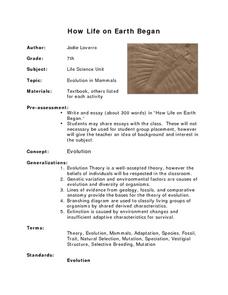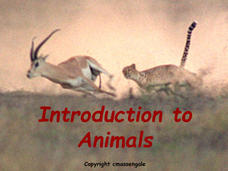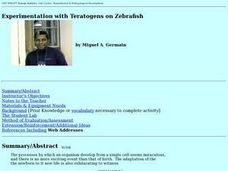Curated OER
The Seven Characteristics of Life
Third graders investigate the characteristics of living and nonliving things. They conduct a research quest in order to identify the seven characteristics of life. Then students pick one aspect and use it to create a song meant to be...
Curated OER
Extensions - Biology Review Unit
Learners engage in a variety of activities in order to review a Biology unit. For example, they research the Bird Flu, it's history, how it is spread, what has been done about it, what better options exist for controlling or removing it....
Curated OER
Life Cycles
Young scholars identify and explain the parts of a flower and their role in the life cycle of flowering plants. In this online plant biology lesson, students explore the processes of pollination, seed dispersal, and germination....
Curated OER
BJU Life Science 2
For this biology worksheet, students locate and identify various vocabulary terms related to the life sciences. There are thirteen words located in the puzzle.
Curated OER
Pond Water Survey
Learners identify and describe various organisms living in a pond water environment. They describe the characteristics of living things. Students compare and contrast organisms created by asexual reproduction and sexual reproduction....
Curated OER
What Does it Take to be a Survivor? Part One
Students explore marine animal adaptation. In this introductory ocean life biology lesson plan, students access prior knowledge by participating in a whole class "thought swap." Students form two lines, respond to a prompt from the...
Curated OER
Health Care
Students analyze information and draw conclusions about the reality of human life expectancy; the battle between health care technology and our own internal time clocks. Students answer questions such as "Why does aging occur and can...
Curated OER
Plant Diversity
Here is an all-encompassing overview of the plant kingdom! In this worksheet, beginning botanists describe characteristics of the four different plant phyla, explain various life cycles, differentiate between monocots and dicots, and...
NOAA
Vertebrates II
Mammals of the ocean unite! Or not. The 20th installment of a 23-part NOAA Enrichment in Marine sciences and Oceanography (NEMO) program investigates how warm-blooded marine mammals survive in water. In the class activity, learners use...
New South Wales Department of Education
Is it Alive?
Interestingly enough, movement is not a characteristic of living things. The first activity in a series of 20 introduces learners to the concepts of living versus non-living things and then focuses on biologists and what they study....
Curated OER
How Life on Earth Began
Seventh graders investigate the concept of evolution and how it was a mechanism for the foundation of life on Earth. They conduct research and attempt to make cognitive connections with the evidence to agree with the presupposition of...
Curated OER
Basic Introduction to Foundation of Life: Genes, Genetics and Genetic Diseases
Students are introduced to genetics along with genetic diseases and heredity. In groups, they complete a Punnett Square to determine the dominant and recessive genes. After viewing diagrams, they identify the characteristics of DNA and...
Curated OER
Invertebrate Phyla
Young scholars explore the invertebrate phyla. They discuss the characteristics of the invertebrate Phyla in the Kingdom Animal. Students classify organisms into Phyla based on their characteristics. They distinguish radial symmetry,...
Curated OER
Classifying Plants and Insects
Art and science come together in a instructional activity based on Flower Still Life by Ambrosius Bosschaert the Elder. Learners classify plants and insects in the painting by color, leaf shape, size, reproduction, and season of bloom.
Biology Junction
Arthropods
Even the creepy crawlers have pretty amazing anatomy! A thorough lesson describes characteristics of arthropods with an emphasis on their structures. Beginning with a review of the taxonomy hierarchy, the lesson explains the different...
Biology Junction
Introduction to Animals
Out of all animals, elephants alone lack the ability to jump. Scholars learn all about animals using a presentation full of fun examples. It describes different types of animals, the biological similarities and differences between...
Curated OER
Are You Gellin
Students conduct an investigation of differentiating between different types of DNA. This is done with a simulation activity of being a scientist in charge of selling different sets of DNA for research which requires different...
Curated OER
Experimentation with Teratogens on Zebrafish
Students compare mitosis and meiosis with regard to chromosome number in parent cells versus daughter cells, types of cells produced, total number of cells produced, and the number of divisions. In groups, identify and differentiate the...
Curated OER
Plant Life Cycle
Fourth graders explore the plant life cycle. They discuss the sequence of events in the life cycle of the plant and illustrate how the life cycle never ends. Students explore the importance of water, sunlight, and nutrients during the...
Curated OER
What is an Animal?
In this animal worksheet, students review characteristics of animals including body symmetry, development, and skeletal structure. This worksheet has 3 short answer questions.
Virginia Department of Education
Prokaryotes
Lead your biology class on a cell-sized adventure! Emerging scientists construct models of prokaryotes, then design an experiment to properly grow a bacterial culture. They conclude the activity by viewing the culture under a microscope....
Virginia Department of Education
Cell Parts
What do a bird, an egg, a rabbit, and a toad all have in common? This fun-filled resource explains the similarities and differences between cells and how all cells are similar, yet all are different. Learners begin by depicting a...
Curated OER
Classification
Tenth graders explain how organisms are classified according to similarities. For this biology lesson, 10th graders research on five different organisms of their choice. They prepare a report and presentation about them which they share...
Curated OER
Animal Characteristics
Students investigate biology by completing a group classification activity. For this animal characteristics, students discuss the different families in the animal kingdom and the small differences that separate the animals. Students...

























